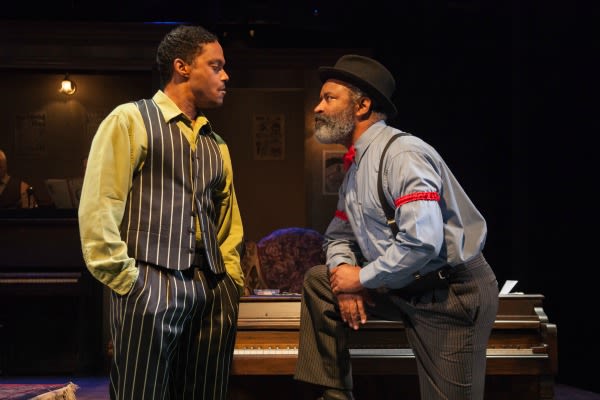WBTT's Ma Rainey's Black Bottom

By Kay Kipling
There’s probably little doubt that some audience members for Westcoast Black Theatre Troupe’s production of Ma Rainey’s Black Bottom will leave disappointed. That’s because while there is some music in this August Wilson play, the show is not a musical, and that’s often what WBTT goers come for.
But if you’re interested in seeing the first work of Wilson’s 10-play cycle tracing the 20th-century African-American experience (WBTT has produced several others in the cycle), and taking the time you must to appreciate it (the show runs more than two hours and 30 minute with intermission), there are rewards here.
Gertrude “Ma” Rainey was a real person, often called the mother of the blues, and in this play, set in 1927 (and in Chicago, unlike the other Wilson works, which all take place in Pittsburgh) the larger-than-life Ma is vividly embodied by Tarra Conner jones. But her character takes a while to arrive in the recording studio where her white manager and producer, and her four black band members, are waiting for her.
That’s because Ma does what she likes, when she likes, and her records have been successful enough for her to get away with it. Not so with the musicians she’s working with. Toledo (Henri Watkins) is the wise old philosopher of the group, a piano man literate enough to explain the ways of the world to the others, including bassist Slow Drag (Patric Robinson), trombonist Cutler (Kenny Dozier) and trumpeter Levee (Robert Douglas). Not that they necessarily want to hear what he has to say, especially Levee, whose cocky pinstriped appearance and determination to form his own band, playing his own songs, mask his haunted memories of a childhood tragedy.

There’s a lot of laughter back and forth between the men as they wait (including some liberal use of the “N-word,” as they refer to themselves and each other) and trade tall tales of their lives. The actors and director Chuck Smith for the most part manage to keep all that talk lively enough to entertain even as we wonder when Ma is finally going to enter.
When she does, accompanied by her young, stuttering nephew Sylvester (Earley Dean) and her apparent girlfriend, Dussie Mae (Emerald Rose Sullivan), she’s also got a policeman (David Abolafia) in tow, following an incident involving her car. Never mind the details; the upshot is that a white policeman can’t believe a black woman like Ma could have her own fancy car, and it takes her manager Irvin (Stephen Emery) to settle that and get the recording session started.
Jones does deliver a couple of numbers in the show, and does so powerfully, but to a soundtrack (the actors are not really playing their instruments onstage, except for a few notes). Angry, bossy but absolutely right when it comes to how she and other black artists are used by white record producers, she’s a strong presence and could provide a lesson for Levee, whose dreams we just know are bound to be shattered.
Douglas has compelling moments as Levee, but sometimes seems to be pushing too hard to convey his character’s seething rage. Sullivan doesn’t have much to do besides pose as Dussie Mae; and even for a cowed and accommodating manager, Emery is too subdued.
But Watkins, Dozier, Robinson and jones are convincing as old blues musicians who sense their time is coming to an end with the advent of a jazzier sound, and Wilson’s play reminds us of their struggles and their place in history. Ma Rainey’s Black Bottom continues through Feb. 21; for tickets call 366-1505 or go to westcoastblacktheatre.org



